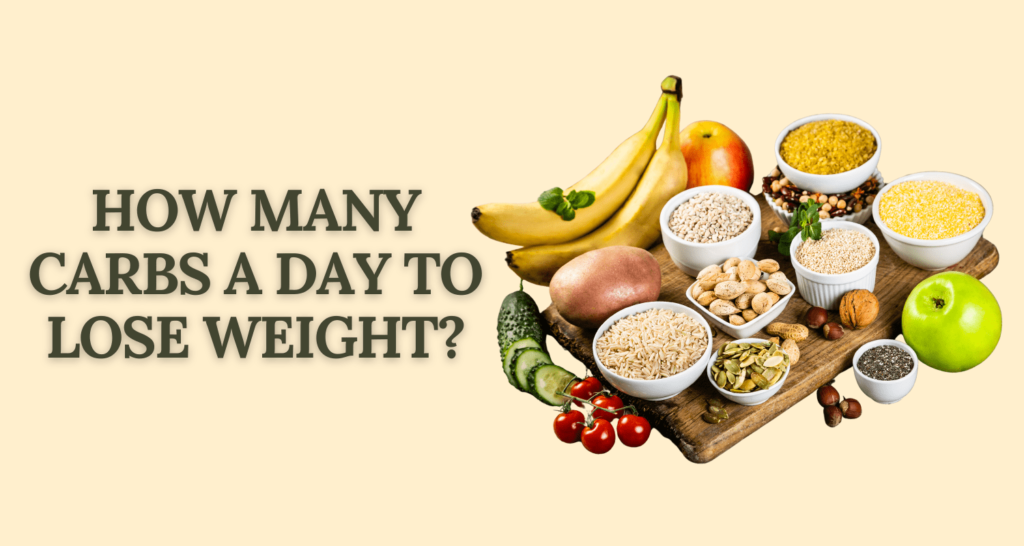Carbs usually make up between 45% to 65% of what we eat each day. They’re vital for our diet and can help or hinder weight loss. So, how many carbs should you eat to lose weight?
In this article, we’ll discover how many carbs a day to lose weight and see safety factors with the benefits of choosing the right carbohydrates for weight loss. We’ll also find a balanced approach and address the intake with tips for healthy carb choices.
Let’s delve into how many carbs a day to lose weight.
Key Takeaways:
- How many carbs a day to lose weight? For weight loss, most people can eat 100 to 150 grams of carbs a day and be safe.
- Spreading out your carbs through the day or eating 40 to 50 grams per meal is a good idea.
- It’s best to choose complex carbs for lasting energy and fullness. Think legumes, veggies with lots of fiber, nuts, fruits, and whole grains.
- Eating the right amount of carbs, watching your portions, and staying active are vital for losing weight over time.
- Your specific carb needs depend on your age, gender, how active you are, and your health.
How Many Carbs Should You Eat for Weight Loss?
Finding the right carb amount for weight loss involves several key points. Your age, weight, how active you are, and health history matter. There isn’t a set number for everyone to lose weight. Yet, cutting carbs and staying active can help.
The Dietary Guidelines for Americans state that 45% to 65% of daily calories should be from carbs for weight loss. For someone eating 2,000 calories a day, that’s about 225 to 325 grams. Still, most people aiming to lose weight might do well with 100 to 150 grams a day. This can change from person to person, so seeking advice is wise.
People who move a lot need more carbs to keep their energy up. This is because intense activity relies on quick-to-use fuel that carbs provide.
Carbs are also vital for the brain and nervous system. Even on low-carb diets, at least 130 grams a day should be eaten for brain and nerve health.
The USDA DRI Calculator is useful for knowing how many carbs you need. It looks at your age, gender, and how active you are to suggest the best amount for you.
Athletes and those who work out might try carb cycling or loading. Carb cycling mixes high and low-carb days to boost energy and fat burning. Carb loading means eating more carbs before a big game or competition to have extra energy.
Remember, not all carbs are good. Avoiding simple carbs found in sugary and processed foods like white bread can be better. Instead, choose complex carbs found in whole grains, legumes, and some fruits. These offer more nutrients and keep you full longer.
Eating the right kind of carbs can help you not feel as hungry and keep your blood sugar steady. Focusing on wholesome carbs and steering clear of sugary snacks supports weight loss. This also makes for a well-rounded diet plan.
Every person’s carb needs for losing weight can be different. Speaking with a healthcare provider or dietitian is smart. They can help design a plan fitting for you. This not only meets your dietary needs but also leads to lasting health.
Are Low-Carbohydrate Diets Safe?
Low-carbohydrate diets are now popular for losing weight. But, we must think hard about their safety and risks. They can help you lose weight quickly, but they might not be good for everyone.
Our bodies need carbs for energy. The Dietary Guidelines for Americans say we should get 45% to 65% of our calories from carbs. For a 2,000-calorie diet, this means eating about 275 grams of carbs each day.
Low-carb diets are usually those with 20 to 120 grams of carbs per day. Different plans allow different amounts. These diets can help you lose an average of 13 pounds (6 kilograms) in a year. But, losing weight so fast might not last.
Be careful with low-carb diets because they can be risky. Eating too few carbs might cause constipation, headaches, and muscle issues. If you eat less than 50 grams of carbs, your body might enter a state called ketosis. This can lead to bad breath, headaches, and tiredness.
Keeping an eye on your saturated fat intake is important on low-carb diets. Too much-saturated fat can up your cholesterol and heart disease risk. It’s better to choose low-carb diets that focus on healthy fats and proteins. These include lean meats, fish, nuts, and seeds.
Quality matters when thinking about a low-carb diet. Focus on your long-term health. It’s very smart to speak with a healthcare pro or a dietitian. They can offer advice personalized for you. They’ll make sure you’re eating right and support your weight loss goals.
Benefits of Choosing the Right Carbohydrates for Weight Loss
Choosing the right carbs is key to losing weight successfully. It’s not just about cutting them out. You should think about the kind of carbs you eat. Picking complex carbs instead of simple ones is better for losing weight and staying healthy.
Reduced Appetite and Stable Blood Sugar Levels
Complex carbs like whole grains, veggies, and fruits have a lot of fiber and nutrients. They take a long time to digest. This helps you feel full longer and cuts down on how often you’re hungry. These foods also don’t make your blood sugar spike like simple carbs. So, they keep your energy levels steady and stop sugar cravings.
Increased Calorie Burning
Eating complex carbs makes your body work harder to digest them. This uses up more energy, which burns more calories. So, choosing whole grains and similar foods can crank up your calorie burning and help with weight loss.
Nutritional Value and Sustained Energy
Simple carbs, like white bread, are low on nutrition and fiber. They lack the vitamins and minerals that complex carbs have. By eating complex carbs, you give your body what it really needs to stay healthy. Plus, they keep your energy stable and you feeling productive all day long.
Focusing on the right kinds of carbs is important for weight loss. But, remember, losing weight in a good way includes more than just what you eat. You need to keep active, eat balanced, and live healthily every day. This mix is the real key to keeping off the weight you lose.
Choosing complex carbs and making them a part of your daily diet is a smart move. It helps you reach your weight goals and keeps your body healthy. This way, you get all the nutrients you need while losing weight.
Finding a Balanced Approach to Carb Consumption
Reaching weight loss goals means finding the right balance with carbs. It’s key to know what carbs do in our diet and then make smart choices. The Dietary Guidelines for Americans suggest carbs should be 45% to 65% of daily calories for everyone. So, carbs are vital for the energy and nutrients we need.
Yet, it’s important to watch how many carbs a day to lose weight and pick the good kinds. Whole grains, legumes, veggies, and fruits are great sources of carbs. They keep us full longer and help steady our blood sugar.
Plus, they give us essential nutrients and fiber for good health. But simple carbs in sugary breakfast foods, desserts, and sweet drinks aren’t as healthy. They can lead to gaining weight and a lack of good nutrients.
For a diet aimed at losing weight, choose more complex carbs and cut back on the not-so-healthy ones. The advice for how many carbs to eat for weight loss can change based on each person’s needs. Generally, aiming for 100 to 150 grams a day is a good target. Also, spreading your carb intake across meals, with about 40 to 50 grams each, can help keep you energized and control hunger.
But remember, lowering carbs alone isn’t the secret to reaching your weight goals. A balanced diet full of nutrient-rich foods, along with regular exercise, is a must. And, talking to a health expert or dietitian, especially for special health needs, is a smart move.
In wrap-up, a balanced carb approach is vital for losing weight. Picking the right carbs, watching your intake, and staying active is a solid plan for success. It’s about long-term weight goals and staying healthy.
The Role of Carbs in Energy and Athletic Performance
Carbs are key for energy during physical activity and sports. Studies over the past 40 to 50 years have shown this. They are the main nutrients to boost an athlete’s performance.
Athletes, especially active ones, need more carbs. Foods such as potatoes, rice, and pasta help relieve glycogen in muscles.
For exercise, experts suggest: 5-7 g/kg of carbs daily for moderate exercisers. Heavy exercisers need 8-12 g/kg. Some athletes need over 12 g/kg if they train hard.
A balanced diet is important for athletes. It should include carbs, protein, and fluids from natural sources for training needs.
Before and during exercise, eat high-carb foods to keep your energy up. This helps boost performance. Afterward, eat carbs that the body can quickly use. This helps replenish energy stores quickly.
New studies say low GI carbs might not help much with very intense exercise. Athletes may need 3-12 grams of carbs per kilogram daily, depending on training.
Quick carbs, like 30 grams five minutes before training, keep muscles ready. The pre-event meal should provide 3-4 grams of carbs per kilogram 3-4 hours before.
During long exercise, have 6-12 ounces of a sports drink every 15-30 minutes. It should have 6-8% carbs.
For different time frames, like 4 hours before an event, eat 1.5 grams of carbs per pound of body weight. One hour before, eat 0.5 grams per pound.
Between events, choose carbs and water-rich fruits for ease of digestion. Avoid high-protein, fatty foods. After competing, focus on carbs and protein to refuel. This aids in better recovery for the next event.
Avoid high-fat, high-calorie foods from concession stands. Bring healthy, nutrient-rich snacks from home. For quick breaks between events (1 hour or less), use liquid carbs like sports drinks. Easy-to-digest fruits are also good.
Addressing Carb Intake for Specific Populations
When we talk about carb intake, we have to think about different people’s needs. Let’s look at how much carbs are right for certain groups:
Carb Intake for Children
Children need certain foods to grow. The WHO says kids 2-5 years old should eat 250 grams of veggies and fruits daily. Kids 6-9 need at least 350 grams, and those 10 and older, 400 grams. These amounts ensure kids get needed nutrients, like carbs, for health and growth.
Carb Intake for Pregnant Women
Pregnant women need more nutrients for their baby’s growth. They should include carbs in their diet. It’s good to eat whole grains, fruits, and veggies, and cut back on sugary and processed foods. This gives them energy and vital nutrients like folate for the baby.
Carb Intake for Diabetes
It’s critical for people with diabetes to watch their carb intake to keep their blood sugar stable. How many carbs they need depends on things like insulin use and their diabetes type. A dietitian can help make a plan tailored to their needs. They should pick foods with a low-glycemic index and spread their carb intake throughout the day.
Carb Intake for Athletes
Athletes need a lot of energy because they’re so active. Carbs are their main fuel and can boost their performance. The right amount of carbs for an athlete changes based on their sport and training. They should work with a nutrition expert to figure out the best plan for them.
Remember, everyone is different even within these groups. Talking to a health or nutrition pro is the best way to get advice that fits your situation or for how many carbs a day to lose weight. They can offer suggestions based on your health, age, and how active you are.
Making Healthy Carb Choices
Choosing the right carbs is vital for weight loss. Go for healthy carbs to help meet your goals safely and get key nutrients. It’s best to choose complex carbs over simple ones because they’re rich in fiber and nutrients.
Here are some top carb choices for your diet:
- Whole grains: Go for brown rice, quinoa, whole wheat bread, and oats. They give you needed fiber, vitamins, and minerals.
- Legumes: Beans, lentils, and chickpeas are brimming with fiber. They also pack a punch with plant-based protein for your diet plan.
- Vegetables: Fiber-rich veggies like broccoli, spinach, Brussels sprouts, and kale are low-calorie and full of needful nutrients.
- Fruits: Choose fruits like berries, apples, oranges, and bananas. They sweeten the deal with natural sugars plus fiber, vitamins, and antioxidants.
- Nuts and seeds: Almonds, walnuts, chia seeds, and flaxseeds are loaded with good fats, protein, and fiber.
Eating these carbs will offer your body essential nutrients. It’ll help you feel full longer, aiding weight loss. But, watch your portion sizes to not overdo carbs. Keeping it moderate is important.
A diet balanced with complex carbs can lower your urge to eat more. It also helps burn calories as you digest and keeps blood sugar steady. This, paired with moving more, boosts your weight loss and health.
Conclusion
How many carbs a day to lose weight? Finding the right balance in carbs is crucial for weight loss. Reducing carbs can help, but it’s key to balance this with good diet quality, controlling portions, and staying active. Healthcare pros and dietitians can offer advice tailored to you for how many carbs a day to lose weight.
Real weight loss means cutting calories but still getting enough nutrients. Choose carbs wisely, like sweet potatoes, whole grains, and lots of fruits and veggies. These foods keep you full and provide many essential nutrients. Don’t forget to think about your personal situation when deciding how many carbs a day to lose weight.
Your daily carb limit changes depending on what you need. The Dietary Guidelines suggest 45% to 65% of your daily calories should come from carbs. For a 2,000-calorie diet, this means around 225g to 325g of carbs every day. Mixing carb control with other key nutrients in your diet plan is very important for losing weight effectively.
Pay attention to your body’s signals and what feels right for you. Understanding how many carbs a day to lose weight and balancing your carb intake well can make your weight loss journey healthier and more successful. This way, you ensure you’re getting the nutrients you need while losing weight.
FAQs
What’s the ideal carb intake for weight loss?
For most people, aiming for around 50-150 grams of carbs per day can be effective for weight loss.
Is consuming 100 carbs a day considered low-carb?
Yes, a daily intake of 100 grams of carbs is generally considered low-carb and can support weight loss for many individuals.
Can I still lose weight by consuming 50 carbs a day?
Yes, a daily carb intake of 50 grams can still promote weight loss, especially when combined with a balanced diet and regular exercise.
How many carbs a day to lose weight?
The recommended daily intake of carbohydrates to lose weight is typically between 20-50 grams per day. However, individual needs can vary depending on factors such as activity level, metabolism, and overall health goals.
Which carbs should I avoid to support weight loss?
It’s advisable to minimize intake of refined carbs such as white bread, sugary snacks, and sugary drinks, opting instead for whole grains, fruits, and vegetables.
Why might my weight loss be slow at 100g per day?
Weight loss can vary depending on various factors like metabolism, activity level, and diet composition. A loss of 100 grams per day is still progress, but it’s essential to consider overall trends rather than daily fluctuations.
Is 30 carbs per day acceptable?
A daily intake of 30 grams of carbs can be suitable for some individuals, particularly those following a ketogenic diet, but it’s essential to ensure a balanced nutritional intake and monitor how your body responds.
What’s the recommended daily carb intake for weight loss?
The optimal daily carb intake for weight loss varies depending on individual factors such as metabolism and activity level, but aiming for 50-150 grams per day is generally effective for many people.
Disclaimer: This content, including advice, provides generic information only. It is not a substitute for a qualified medical opinion. Always consult a specialist or your doctor for more information. Nutrition Cult does not claim responsibility for this information.




